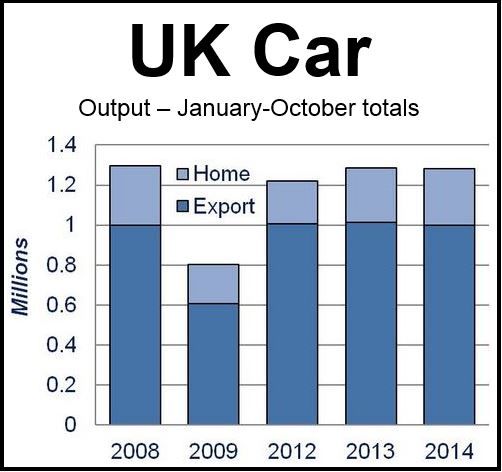UK car production declined by -6.7% in October to 150,060 units compared to September, the Society of Motor Manufacturers and Traders (SMMT) announced on Thursday. Year-to-date volumes are -0.3% down versus the same period in 2013.
Demand has been undermined by global economic uncertainty, the SMMT informed. Approximately 80% of cars built in the UK are exported, with half going to the European Union.
However, it added that outlook continues to be positive with production levels over the next five years expected to hit an all-time record.
Russia was the UK’s second-largest non-EU export market last year. In 2014, export volumes to Russia have plummeted due to Western sanctions and a weak economy.
With car manufacturing fairly flat so far in 2014, the SMMT doubts that the UK will hit its full-year target of 1.59 million units, which had been forecast at the beginning of this year.
SMMT Chief Executive Mike Hawes said:
“The UK’s car manufacturing industry is still in a strong position in spite of the growing uncertainty surrounding the global economy. Billions of pounds have been invested into UK facilities in the past two years, with several new models starting production this year and more in the pipeline. There is still demand for UK-built products given their reputation for quality, design and engineering excellence.”
Source: SMMT.
Commercial vehicle manufacturing
Commercial vehicle manufacturing in the UK in October was -8.9% down, the smallest drop since June 2013.
For the UK market, commercial vehicle production increased by 14.6% in October, while exports declined by -30.6%.
Year-do-date commercial vehicle volumes fell -23.5% to 57,981 units. The SMMT says production is still affected by 2012’s restructuring.
Regarding commercial vehicles, Mr. Hawes said:
“The heavy fall seen in UK commercial vehicle manufacturing over the past year is now levelling off as the effects of last year’s restructuring only apply to year-to-date figures. With new models now being produced in UK plants, production for the home market grew for the first time since June 2013. It remains to be seen if the recent growth in EU demand will continue, but the indications are of greater stability in the months to come.”

